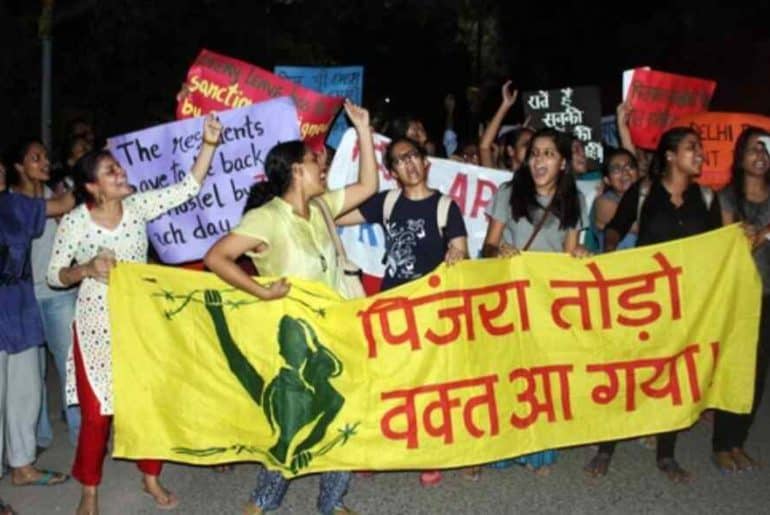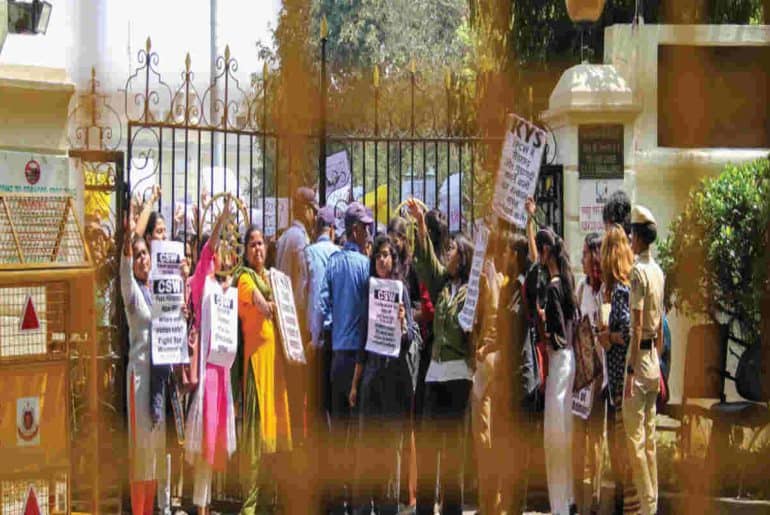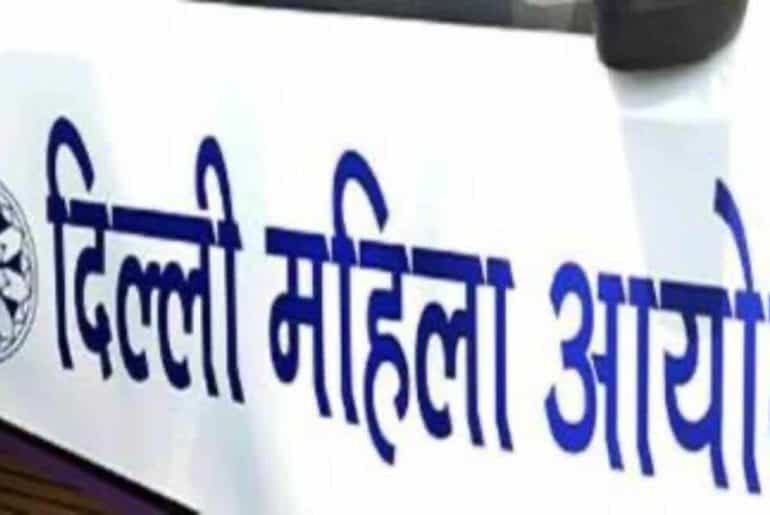On 1st April 2023, DU Beat spoke with Dr. Abha Dev Habib, an Assistant Professor of Physics at Miranda House and a women’s movement activist, to discuss the condemnable incidents that took place in Indraprastha College for Women on 28th and 29th March 2023, during their Annual Fest ‘Shruti’, where some men scaled the walls of the college and harassed women inside the college premises.
Question: Thank you so much ma’am for joining us. So I would like to begin by asking your views or how you see the recent developments that unfolded in Indraprastha College for Women.
Dr. Habib: Thank you. Yes, I find it very unfortunate. One, of course, the whole assault where male students and other students are trying to barge in, and then there was that was one incident that also happened in Miranda in October 2022, during the Diwali Mela. But what I find most unfortunate today is that when the students are protesting and women students are protesting, they feel that their space has been occupied, that they were molested, and that the administration and the police have not taken enough steps. Instead of extending support, instead of allowing that protest to happen, allowing that outrage to happen, the administration of the college and the police is diverting their energy in trying to stop this protest, in harassing women, students, young women, and they’re being told that the college will inform their parents and that they cannot protest like this. The police have been continuously detaining the protesters. I find that extremely objectionable because if women are not even allowed to protest against this violence, then I do not know. I think in some sense the administration and the police have sided with those who have molested people, who have outraged the whole thing. I mean, the people have been molested, and the administration is siding with them and is standing against the decent.
Question: So, as you mentioned there is apathy on part of the administration. We have seen an irony in the deployment of police forces when it comes to detaining people and a meager deployment or almost no deployment of forces when it comes to providing protection to the people. So how do you see this trend?
Dr. Habib: This trend is very disturbing. And one thing is the short-sightedness of the administration in saying that there will not be too many people wanting to come into the college. These fests are happening after a gap of two years COVID period when they were not happening at all. And there is hyperactivity in all colleges. All societies want to function, all societies want to have fests. And when the college is throwing open its gate to all, there will be sort of a huge rush. So there may be a short-sightedness or miscalculation on part of the administration and trying to get the police on time or to have arrangements on time. Now, however, what is happening after students protested is that they were molested and the police were called to detain them. I find that unacceptable and unfortunate and this should not have happened. This cannot happen. While you can pardon the administration for the first part, of course, we make mistakes and there was a miscalculation, I cannot pardon the administration for the second. What these protests are doing, apart from letting focus on the way the space was occupied and creating an awareness of gender sensitization, these protests are actually calling out to all student community to say that women’s colleges cannot be closed down just because the society is such that women will be molested or something. You cannot force women to stay back home. You cannot close down doors on them and allow everybody to have a good day outside. And what we are saying is that if we have too many police or we start making these festivals as closed festivals, that is not an answer. The answer lies in gender sensitization. It lies in the awareness of the people. And these protests are actually a call for that order. They are calling out to people to have that sensitivity. And the unfortunate part is that the administration is seeing these protests as against them. It is seeing these protests as something against the college and is detaining students. So this is not something that is acceptable or which can be forgiven.
Question: So ma’am, we have seen this phenomenon is not new and such instances have happened in Miranda House and previously in Gargi also. So why do you think such colleges, and women’s colleges in particular, are targeted by such violence? And how safe are these places for women when we compare them to the other co-ed colleges? Because it’s a common perception that women’s colleges are comparatively safer.
Dr. Habib: Yeah, I will start the other way around. These colleges have served the nation. These are very safe places where women really discover themselves. Many feel empowered, they move forward. And Miranda House, IPCW, LSR, Kamla Nehru, Gargi, all these colleges have contributed immensely. If we look at Miranda House, the number of women scientists it contributes is immense. It is only in recent times that these situations of outrage have occurred. I was at Miranda House first as an Ad-hoc teacher from 2001-05, and then as a permanent. So in 23 years of service, it was only during the Diwali Mela of 2022 that I found this kind of masculine behaviour and entering the college and disturbing the classes. They came and then also tried to occupy as if they were trying to occupy Miranda. That I had never seen earlier. Yes, I had seen crowds during fests when we call some big singer or a star to the college. Yes, people want to come in and they want to enjoy. And there are cases of molestation and all even then, but that is not limited to women colleges. It will happen anywhere. And in Miranda House, in IPCW, the fact that women are outraged, feeling outraged, that they’re on the streets, is because of their awareness. And in fact, that also in some sense, gives you an idea of how empowered women feel in these colleges, and therefore they are voicing it in the form of protest. So I see women’s colleges as very, very safe places.
Yes, but I want to say that what is happening in colleges today has to be seen as a larger thing, where we find masculine behaviour on the rise, where we find a mob mentality on the rise, where we find the whole questioning yourself, what is your domain, what is somebody’s else domain? And do you have the right to do this? We are losing those questions. There is in some sense a return to these issues, gender and all. Yes, they are in the curriculum, we have gender studies and all of that. But are we in our daily lives practicing them? An unfortunate part is that the central government and the governments are failing. In Bilkis Banu’s case, eleven rapists will be freed. Is that the message? So far as a woman activist, I find that to be a problematic thing. In Katwa, when an eight-year-old Muslim girl is molested and raped and it was so gruesome we couldn’t even read through the newspaper, we see that the whole case is given a Hindu-Muslim angle and there is a protest by the Hindu right-wingers there. And this has to be isolated from every Hindu. I’m not talking about every Hindu. The same thing has happened in Bilkis Banu. So there is this thing of that mob. In a mob, nobody gets caught, and nobody gets punished. And this is what we have experienced in last so many cases, whether it was about women, whether it was about murders. And I think that is a problem. It is because of how the government sees finally.
There are all kinds of tendencies in society, but it is because of the fear of law and order that most people work in a particular manner. That fear has to remain. If the justice delivery system, if all of that collapses, then this mob will be on the rise and today you are seeing that in women’s colleges; this is true in all-women colleges. Because see, I mean education, if you look at the Constitution, the forefathers saw education as the only possible way of transforming society. And therefore education was treated as a public good. Women colleges are questioning the social order, they are breaking free of the conditioning and creating something new. Sometimes societies feel very endangered about it. And right now the right-wing Hindutva element is finding it difficult to digest centres like JNU, which have brought social transformation, which talks about equity and has given space to students coming from marginalized sections. So you will see a systematic attack on JNU. In DU also, women’s institutions are seen as left, whereas they are not just left, they are questioning and they are creating a new order, which actually is the task of the education sector. And therefore also I think that there is an additional attack.
The attack on Gargi and what all happened there, again reading newspapers, it was very difficult to visualize that people were raising such slogans or doing something like this or masturbating and so on and so forth, or at Miranda House and now in IPCW. And therefore I feel that the protests which are going on right now by the women students, these protests are very important because if women will not protest this, then the only order which can prevail and which will help the right-wing forces is to shut down women in their houses. And this is not acceptable to us. For example, the whole movement of Pinjira Tod was a very important movement. It questioned the timings of women’s hostels vis-a-vis giving the same arguments of security and all. Whereas we have experienced that the spaces will become safer and safer if women will inhabit that, if women will be out on the street till late. But women will be there when the lighting will be proper and so on and so forth. So I think we have to look at these incidents in the context of what is happening in the country today.
Question: As you said there is a need to create awareness and all. So, with the advent of the New Education Policy, there has been an introduction of subjects like value addition courses (VAC) and skill enhancement courses (SEC) and all of that. But we see there is a conscious exclusion of gender sensitivity or even sex education in these courses. So how important do you think are these courses in light of what is happening currently in IPCW?
Dr. Habib: I hope many first-year students will get to hear this interview. I see SEC, VAC as very, very diluted courses and which have neither added to the skill of the students nor added value. I do not know what value you can gain in class and also the courses started only midway. The whole idea or the advertisement of skill enhancement courses is that they will add to the skills which are marketable. So, therefore, I do not know whether these are the proper places for gender studies. But gender studies is a very important part of humanities and social science courses. And I think in depth there are many topics which give space for discussions like this in literature also. But there should be a continuous discussion. Of course, there could have been a paper on gender issues in value-added courses. What I’m saying is that, yes, there are many places where we can study them, and debate them. And you know that each college has a Women Development Cell (WDC) which also organizes a large number of seminars and conferences where they call people to deliberate on important issues. It is not only that when we sit in the seminars or what we study in our course transforms us–that is, of course, a very, very important part which transforms–but how the machinery of the country is functioning, that becomes a very important thing. Because finally, you have to understand that, what is the number of people coming to universities. It is still hovering around 25% of the Gross Enrollment Ratio. So how many are reaching the universities? How many are reaching higher education? One has to understand that, to understand the transformation which the universities alone can bring. They are very important centres but it is also in the way the government will conduct itself. If the government will conduct itself, the justice delivery system will do okay. The learning is also in all of that. So I think it is the whole system which we have to see. And yes, more courses can be added. I agree with its addition in value addition courses. But I don’t see that as the only way forward.
Question: So, before we end this, is there anything else that you would like to tell us about the whole situation?
Dr. Habib: No, I just want to, through this interview, express my solidarity with the protesting students. In fact, WDC units of all colleges should come together to think about how to roll out gender-sensitizing programmes across the university. Not only students but teachers and karam-charis and administration will have to respond to this crisis. Because this is not going to be with just women colleges. It will spread to all. And even in co-ed colleges, I do not see that this will not happen there. Either you open your gates, don’t try to close them, and let everybody come in. Are we ready to have 20,000? And can we prevent things like stampedes or any other tragedy which may just happen anywhere? So I think we all need to put together our minds on how to take gender-sensitizing within the campus and outside. I think the WDC of all the colleges should come together to have outreach programmes on this also. But my absolute solidarity with the protesting young women and I think it is for us to protest. The solution does not lie in closing down the gates of women’s colleges or having all programs only limited to the population inside. The whole idea is to bring a social transformation so that these gates can remain open, and that women can walk on the streets fearlessly. And in this, I think the government needs to hear what people are saying. And the government needs to be more sensitive. If rapists will walk free, there is no way of preventing all of this.
Read Also: Interview with Dr. Maya John
Interview by Samra Iqbal
[email protected]









